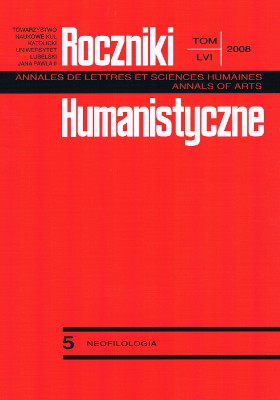The structural location of Case Phrase (KP) in Old English
Abstrakt
[Abstrakt tylko w j. polskim / Abstract only in Polish]
Struktura frazy przypadka (KP) w języku staroangielskim
Artykuł omawia strukturę frazy przypadka (KP) w języku staroangielskim w ujęciu generatywnym. Zamiast jednak analizy przypadka jako cechy, zgodnie z wczesnymi założeniami Programu Minimalistycznego Noama Chomsky’ego, autor podejmuje próbę analizy tego elementu jako samodzielnej projekcji funkcjonalnej (KP). Autor rozważa trzy możliwości: w pierwszym przypadku projekcja funkcjonalna KP umieszczona jest nad frazą określnika (DP); w drugim podejściu KP znajduje się pod frazą określnika; w trzecim wreszcie – fraza KP jest połączona w jedną całość z DP. Aplikacja danych z języka staroangielskiego pokazuje, że jedynie ostatnia możliwość jest w stanie wyjaśnić dane w zadowalający sposób. W związku z tym postulowanie frazy przypadka jako samodzielnej projekcji funkcjonalnej jest zbędne.
Bibliografia
Bartnik, A. (2008). NP Structure in Old English: Quantifiers and Other Functional Categories, unpublished Ph.D. Dissertation, John Paul II Catholic University of Lublin.
Cardinaletti, A. & G. Giusti (1991). Partitive Ne and the QP Hypothesis: A Case Study. Ms., University of Venice.
Giusti, G. (1991). The Categorial Status of Quantified Nominals. Linguistische Berichte 136: 438-454.
Giusti, G. (1995). A Unified Structural Representation of (abstract) Case and Articles. Evidence from Germanic. In: H. Haider, S. Olsen & S. Vikner (eds). Studies in Comparative Germanic Syntax. Dordrecht: Kluwer, 77-93.
Hale, K. & M. Bittner (1996) The Structural Determination of Case and Agreement. Linguistic Inquiry 27: 1-68.
Hong, S-M (2005). ‘Exceptional Case-Marking’ and Resultative Constructions, Ph.D. Dissertation, University of Illinois.
Lamontagne, G. & L. Travis (1987). The Syntax of Adjacency. In: M. Crowhurst (ed.). Proceedings of WCCFL 6. Stanford:
CSLI Publications, 173-186.
Mallen, E. (1998). Agreement & Case Matching in Noun Phrases in German. In: A. Werner & E. van Gelderen (eds). German: Syntactic Problems- Problematic Syntax. Amsterdam: John Benjamins, 191-230.
Millar, R. McC. (2000). System Collapse, System Rebirth. The Demonstrative Pronouns of English 900-1350 and the Birth of the Definite Article. Bern and Oxford: Lang.
Mitchell, B. (1985). Old English Syntax. Oxford: Clarendon Press.
Olsen, S. (1989). AGR(eement) in the German Noun Phrase. Syntactic Phrase Structure Phenomena. In: Ch. Bhatt, E. Löbel & C. Schmidt (eds). Noun Phrases & Sentences. Amsterdam: John Benjamins, 39-49.
Taylor, A., A. Warner, S. Pintzuk, & F. Beths (2003) (eds). The York-Toronto-Helsinki Parsed Corpus of Old English Prose. Oxford: Oxford Text Archive.
Toman, J. (1994). Case as a Functional Projection. In: J. Toman (ed.) Proceedings of FASL. The Ann Arbor Meeting, 173-181.
Valois, D. (1991) The Internal Syntax of DP. Ph.D. Dissertation, UCLA.
Vangsnes, O. A. (2001). On Noun Phrase Architecture, Referentiality, and Article Systems. Studia Linguistica 55(3): 249-299.
Copyright (c) 2008 Roczniki Humanistyczne

Utwór dostępny jest na licencji Creative Commons Uznanie autorstwa – Użycie niekomercyjne – Bez utworów zależnych 4.0 Międzynarodowe.





